During the post-screening discussion of Fafa: Perjuangan Yang Tak Didendang, Sam (not his real name), who was in the audience, stood up to share how the film inspired him to open up about his own mental health struggles and how he wants to contribute to fighting prejudices against mental illness.
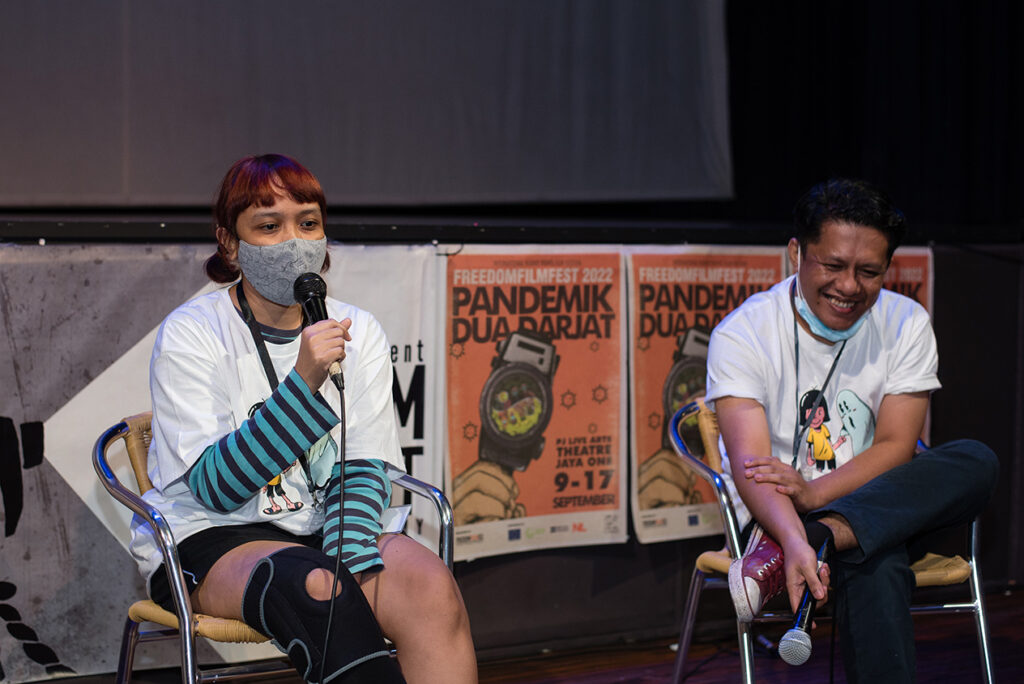
In the film, the protagonist Fafa, told how she overcame hurdles and social stigma to get help with her mental illness. Fafa: Perjuangan Yang Tak Didendang was one of 12 Malaysian films that were screened to packed audiences during the FreedomFilmFest 2022 (FFF2022), the first time it returned as a physical event after the COVID-19 pandemic.
Sam is a suicide survivor, and his experience and connections with other survivors has made him realise that issues dealing with suicide and self-harm are often misunderstood and under-reported. This is even as the Malaysian public and the government have started to devote more resources and pay more attention to mental health in general.
“When I visited my hometown recently and met with some of my ex-teachers, they told me how they received homework papers that were smeared with blood,” Sam recounted to the rapt audience during the post-screening talk of Fafa and another film Jiwa Pendidik.
“Some of their students were self-harming due to the stress in their families and the hardships they experienced in the pandemic,” Sam explained, adding that outside the Klang valley, public support systems for mental illness are scarce.
Sam was inspired by Fafa – the film and its eponymous protagonist – and said her courage in speaking out has driven him to explore making his own film on suicide survivors to counter public misconceptions about the issue and advocate for more support for them. He has even approached FreedomFilmFest 2022’s organisers to talk about possible production support for his project which he aims to start next year.
This is a prime example of what happens at FreedomFilmFest and why even in an age where viewers can get their films online or screenings can be done through zoom, physical film screenings and talks provide experiences that are richer, deeper and more meaningful.
For veteran Jeanne Marie Hallacy physical screenings for documentary films are critical, since these works aim to make a positive impact on society.
“Being in a screening and a talk creates a stronger resonance for the viewer because in films that deal with social justice, there are a lot of issues to unpack and understand,” says Jeanne, who screened her latest work Padauk: Myanmar Spring at FreedomFilmFest 2022.
“People who watch documentaries usually want to contribute to society. They will ask how they can help, what can they do? So these post-screening talks are critical to providing those ideas,” said Jeanne, whose work has been screened at universities and international film festivals over the past few decades.
Expanding what is “Malaysian Cinema”
After a virtual edition in 2020, FreedomFilmFest 2022 came back with a bang with an on-the-ground festival from 9th to 17th September at PJ Live Arts in Petaling Jaya, Selangor to showcase 34 socially-themed films from all over the world that were made just before and during the Covid-19 pandemic.
These works brought diverse and critical perspectives on the theme of Pandemik Dua Darjat or Pandemic of Inequality that are often missing from the mainstream. Its main draw were the 12 Malaysian-made films that were produced or co-produced with The Freedom Film Network.
These included Fafa: Perjuangan Yang Tak Didendang and Jiwa Pendidik, as well as Grey Scale and Can’t Run, Can’t Hide, which were all from FFN’s grant films programme. Orang Asli voices were also prominent in five films – Klinik Ku Hutan, Rahsia Rimba, Selai Kayu Yek, Empangan Nenggiri: Suara Bantahan Orang Asli and Baliu Kano Kai.
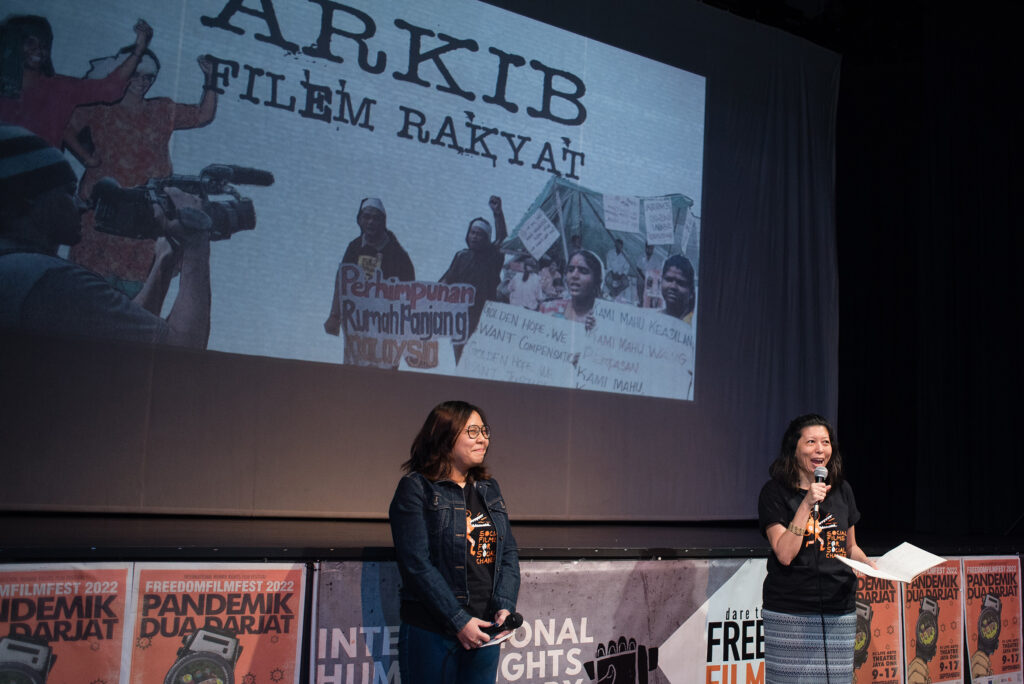
Besides film screenings, FFN launched Arkib Filem Rakyat, an initiative to collect, archive and share video material of social movements through-out Malaysia’s history that have either been missing or suppressed from mainstream discourse and which include public rallies, citizen actions and interviews with activists.
The network also launched two in-depth studies on the country’s film censorship system and its impact on society and the film industry as part of the Bebaskan Filem initiative to reform how films are regulated in Malaysia.
Despite initial worries that audiences worn out from the pandemic would shun serious topics, almost each session was packed to the rafters, observed Masjaliza Hamzah, who is a project coordinator for the European Union, one of the festival’s main partners.
“It was a huge success! The attendance was amazing throughout – full house on many days! People yearn for human connection, especially post-pandemic and after almost three years of online screenings, it was a good time to come out and watch the films together,” said Masjaliza, who attended almost all the screenings and talks.
According to registration data, over 2,100 individuals attended the 20 sessions that were spread out over seven days.
One regular attendee, Isad Chung, described his experience as “great” and “eye-opening” as it featured so many works that tackled complex topics by creators who were either amateurs or newcomers.
“FFF 2022 showcased the possibilities of the normal individual to pick up filmmaking, especially on very niche topics of interest”
Isad Chung
Isad Chung adds that the barriers of entry into filmmaking are now manageable, more diverse and interesting stories could be made.
The student film category was a case in point where the works included those about life after prison, families torn apart through pandemic lockdowns, low income households struggling with expenses for a festive celebration and first-hand accounts of the devastating Sri Muda floods.
The fact that the above films could be made, even during pandemic lockdowns could inspire more social films on other topics such as public transport or access to government documents, said Isad, who works for the Sinar Project, a civic-tech initiative to make information more accessible to Malaysians.
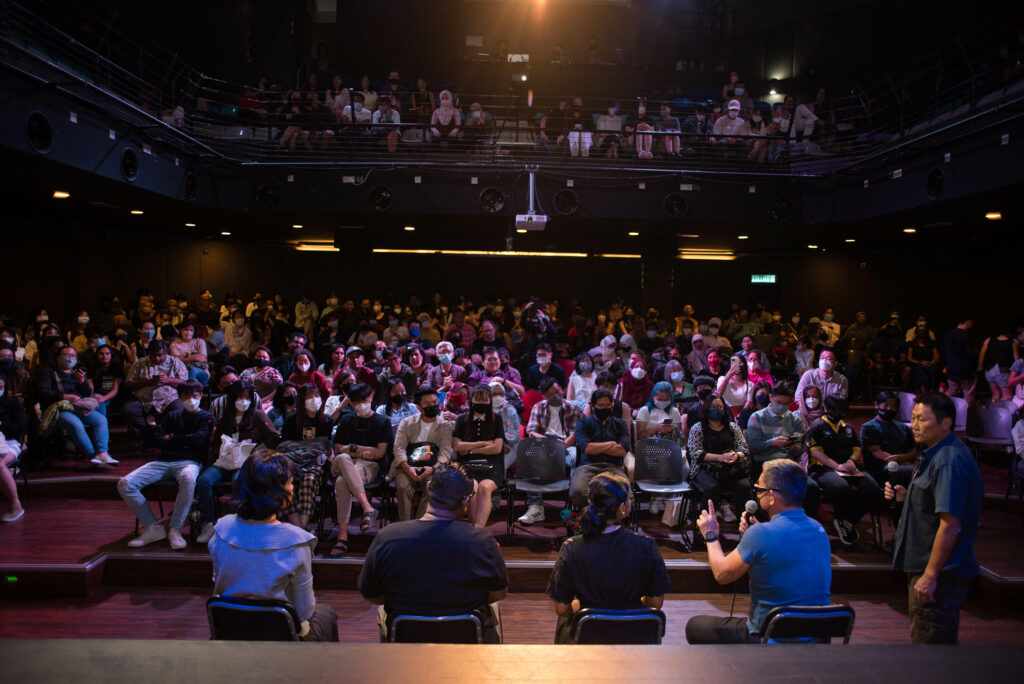
Datuk Kamil Othman, a judge for FFF 2022 and festival supporter, echoed this, saying that this was a bumper year for showcasing how individuals can harness digital technology to tell audio-visual stories that in the past was told mainly by writing.
“FFF 2022 has made a very important point – that the digital environment has provided an enhanced way for anyone to tell remarkable stories as long as they are resourceful. So the next wave of historical documents and statements on social issues is now possible in this form,” says Kamil, who started attending FreedomFilmFest in 2008.
This accessibility, argued Kamil, is important as it expands the horizon of what Malaysian cinema beyond just movies meant to entertain or artsy movies meant for the international circuit, he says.
The FFF platform is a hybrid, “other cinema” that blends story-telling techniques usually used in fictive works with the focus on a social message that are emblematic of documentaries, says Kamil, a former CEO of Malaysia’s National Film Development Corporation (FINAS).
Building communities, saving lives
Besides local productions, FreedomFilmFest 2022 gave audiences a window into the social landscapes of Malaysia’s neighbours post-Covid by curating a screening and talk featuring works from Cambodia (Not Love Songs), Thailand (Pattani Calling) and Myanmar (Padauk: Myanmar Spring).
For Jackson Brook, who directed Not Love Songs, FFF 2022 was the first time he was able to show his film on the big screen to an audience and the experience was important to him as a young filmmaker.
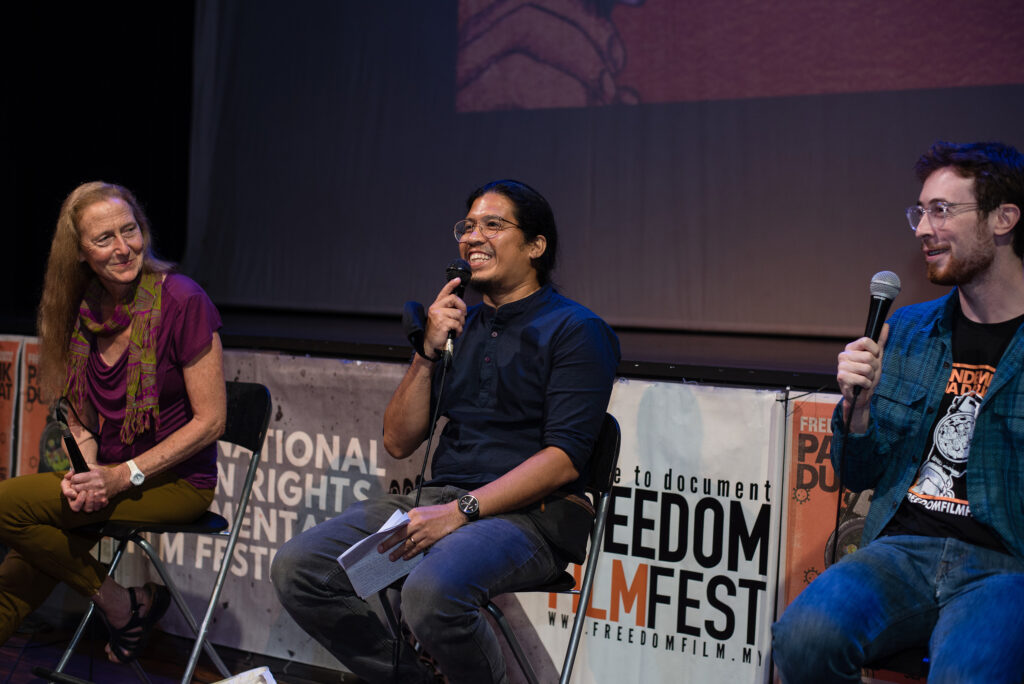
“I felt like all the time and effort which went into making the film was validated by the screening. I appreciated the opportunity to speak further about the film in the discussion and was pleased that many audience members had questions and seemed to care about Sokun (main character in Not Love Songs) and his family”, said Jackson, who is a journalist based in Phnom Penh.
“I think that sharing this film outside Cambodia will raise awareness about the lack of freedom of expression there while also elevating Sokun’s profile and music. It also puts his struggle in conversation with other activists across the region”, adding that he felt emboldened by his experience at FFF 2022.
“I have come away really wanting to make another film and to continue to be engaged in human rights and remain in conversation with others across the region. It made me feel like a real filmmaker and someone who was contributing to a larger struggle for human rights.”
These experiences and comments speak to not just the power of films to move people. Physical screenings and talks can help build a community and space where stories of the ‘other’ can be heard, and solutions to our social issues can be imagined and discussed.
Jeanne likens the FreedomFilmFest experience as a Malaysian-style ‘teach-in’, an activity popularised by American civil society in the 60s and 70s but which are still used today to spread awareness, advocate and organise for change on socio-political issues.
“They could take many formats such as lectures and film screenings but the emphasis was on participation from the audience. The two-way interaction makes the story more tangible for the viewer and they are likely to share their experience with others. This is the strength of the festival – the engagement between the audience and what is on screen.”
For Rahmah Pauzi, the director of Jiwa Pendidik, the ability for the characters themselves to see themselves on screen leads to a certain catharsis where their eyes are finally opened to problems in the system they are a part of.
Jiwa Pendidik is a story about the flaws in the public school system as told to the eyes of a select group of senior teachers from Sekolah Menengah Perimbun in Selangor.
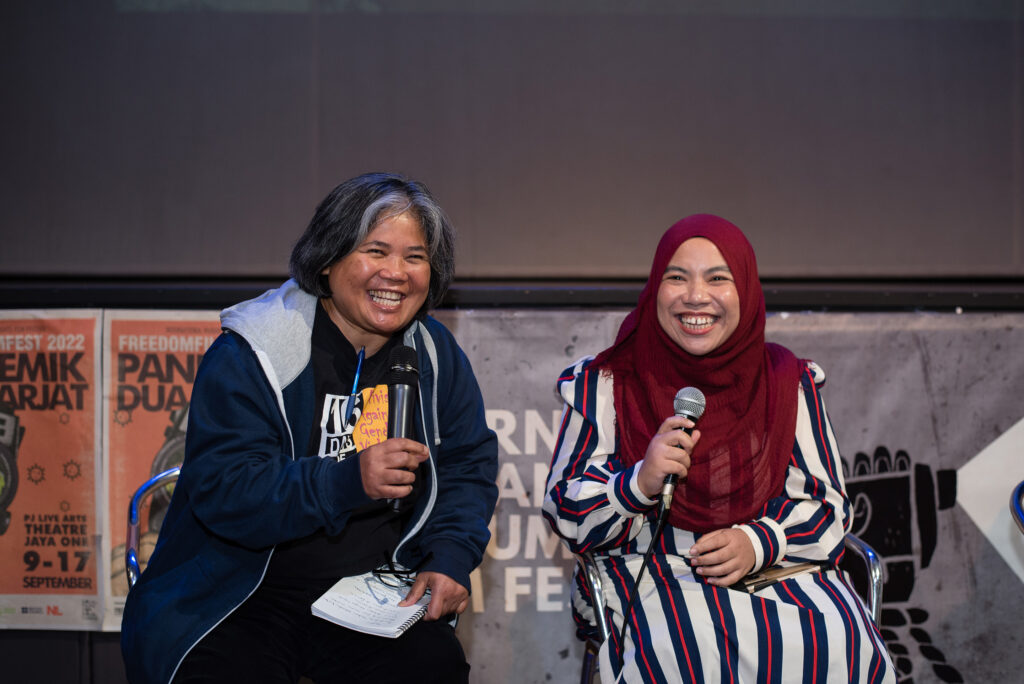
“These teachers are going out of their way to do their best for their pupils but they don’t realise how hard their lives are,” says Rahmah, a former student of the same school.
“So when they finally watch themselves on screen and see how they had to wait for a decade for a computer printer, they finally see that what they go through really is ridiculous and the system is problematic,” says Rahmah who aims to screen the film among parent-teacher groups, teacher unions and policy makers to spark change in the school system.
But sometimes in the case of Fafa (profile in Fafa: Perjuangan Yang Tak Didendang), positive change can be as simple as giving someone the voice and the courage to stop suffering in silence and to seek help.
“People who suffer from mental illness have told me that after watching the film, they feel brave enough to talk about their own experiences after suffering silently for so long. Now they don’t feel so alone and they know that they can go out and get help,” says Fafa.
